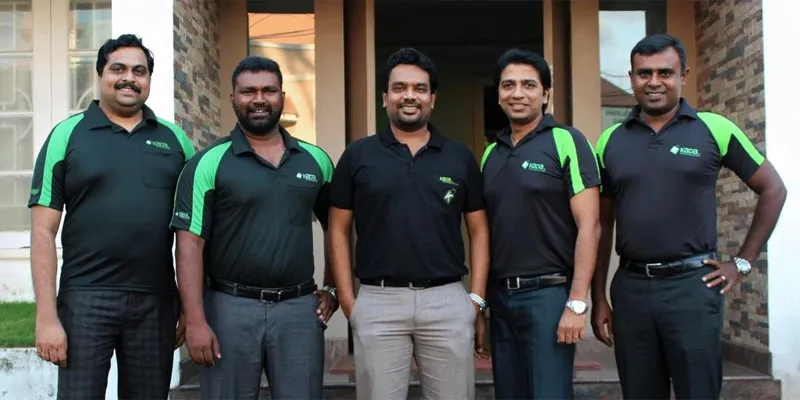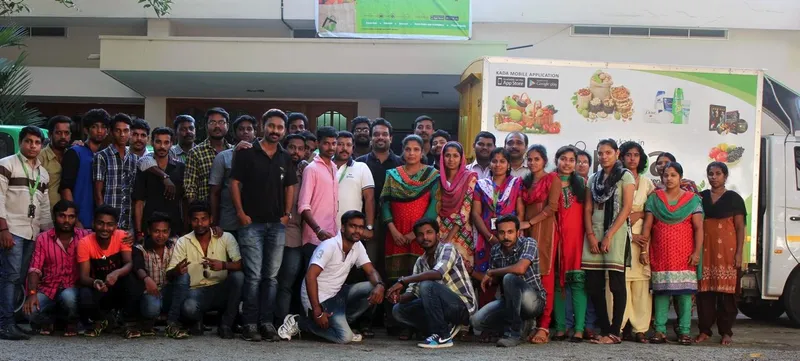When in Kerala, log on to Kada to get your groceries
People in Kerala are surprisingly slow to adapting to technology. But the younger generation is changing that. In 2012, when online grocery market was taking its baby steps in India’s metro cities, the concept was almost unheard of in God’s Own Country. But things were soon to change in its capital city. Currently operational only in Trivandrum, Kada.in is Kerala’s first and only online grocery store.

Five friends, one dream
When their classmates were all thinking of getting into MNCs with top IT jobs, five final-year students of Computer Science stream at Sree Chitra Thirunal College of Engineering, Trivandrum, were dreaming of entrepreneurship. Krishna Prasad, Anoop G. Kumar, Shan M. Hanif, Shinoj S. and Jenu Joseph launched Neologix, a software firm, before the end of their final year of B.Tech. A decade later, Kada was born from the same team.
On the inspiration to start Kada, Shan says, “One of the offices of Neologix is situated in Trivandrum’s Technopark, the largest IT park in India. We noticed that most techies seldom have any time for grocery shopping.” An MBA graduate from IIM-Calicut, Shan got ample support from his Neologix Co-founders for this project too.
Kada’s first customers were mostly the team’s network of friends and colleagues inside Technopark. Three years later, the customer base has increased so much that the network is only 20 per cent of the total number. NRIs are also keen on buying groceries online; they mostly order for their ageing parents living alone, and do the payments online.
Slow and steady
It took Kada more than a year to start making Rs three to four lakh per month. Till date, they have invested around Rs 1.25 crore and get revenue of Rs 15 lakh per month – 15 to 20 per cent of it from their app. They currently get 2,200-2,500 orders per month. Presently, Kada has 50 members as well as some part-time employees. It operates on a combination of its own inventory for fast-moving products, as well as partnerships with retailers in the city. The company provides same-day delivery to offices or houses, depending on the customers’ convenience.
Aiming to focus only on Tier-II and Tier-III cities, Kada’s initial plan is to expand throughout Kerala - in Kollam, Cochin, Thrissur and Calicut - since these cities require lesser investment and personnel. After that, the company aims to venture into the Tier-II cities in Karnataka, Tamil Nadu and Andhra Pradesh – all in a span of 18 months. By 2017-18, it aims to touch Rs 40 crore revenue.
Kada has some unique initiatives to its credit:
- Scrap Barter Deal – the company buys old newspapers from customers for Rs 10/kg and gives them grocery in exchange.
- Kada is planning to collect all kind of scraps (newspapers, old books, aluminium, steel, brass, copper, old TV etc ) and give in exchange equivalent coupons to customers to purchase grocery from its platform. The plan is to sell the e-waste to disposal companies the startup has tied up with.
- Kada plans to use the newspapers collected from customers to tie up with self-help groups, destitute homes etc., for creating paper carry bags for Kada.
- ‘Kada.in Specials’ is an effort to encourage women entrepreneurship. A campaign to encourage housewives to become entrepreneurs by having them create products (such as pickles and snacks), Kada sells those items through their platform. “There were laws and regulations to have brand names, license, labels with manufacture dates etc. The women concerned may not be able to do all these. So now we are planning a team for this purpose, once the funding comes in,” says Shan.

Hurdles on the way
Challenges for Kada are best explained in the context of Kerala’s particular market space. Compared to metros in other States, it is difficult to make Keralites buy groceries online. They are used to buying after touching and feeling things. However, there are also advantages such as the vast road network which provides complete accessibility in Tier-II and Tier-III cities.
Anoop G Kumar, Director of Kada, says that one of the biggest challenges they have faced was that the humidity made the vegetables soggy. “Customers complained of lack of freshness, so we got vehicles with thermal protection to improve the quality. To get the right kind of resources, we often have to go out of the city,” he says.
None of the biggies in the online grocery market have entered Kerala yet. “Nobody has tried to make the people here understand this concept; we were the first to identify that as a good opportunity,” says Shan. Kada has been getting requests from other districts to begin their service. “In smaller cities, revenue might be less. But it requires lesser investment; we can build the brand too,” he adds. They are now in discussions with venture capitalists and angel investors for funding.
The food and grocery industry in India is now worth $383 billion and is expected to touch $1 trillion by 2020, according to a study by advisory firm Technopak. Online grocery industry market is surely growing in India. In the past three years, there have been a handful of players who thrived, when most others lost out. But the top six players - BigBasket, Zopnow, Peppertap, Grofers, LocalBanya and Jugnoo - raised over $120 million in funding just this year, and are all expanding to Tier-II cities. Competition is increasing for the startups in the sector with biggies like Ola, Flipkart, and Amazon entering the space.
While Kada now has the advantage of being the lone player in the field in Kerala, the inevitable entry of the biggies in course of time will create competition. However, as experts say, since the online grocery sector is in its growing stage with more business models evolving, there is enough space for multiple players and scope for their rise.







